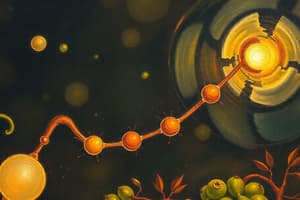Podcast
Questions and Answers
Oxidative phosphorylation primarily occurs in the outer mitochondrial membrane.
Oxidative phosphorylation primarily occurs in the outer mitochondrial membrane.
False (B)
During oxidative phosphorylation, a proton gradient is created across the mitochondrial membrane.
During oxidative phosphorylation, a proton gradient is created across the mitochondrial membrane.
True (A)
ATP is converted into ADP and Pi in the ATP synthase complex during oxidative phosphorylation.
ATP is converted into ADP and Pi in the ATP synthase complex during oxidative phosphorylation.
False (B)
Gluconeogenesis is a process that converts glucose into non-carbohydrate precursors.
Gluconeogenesis is a process that converts glucose into non-carbohydrate precursors.
Gluconeogenesis occurs primarily in the liver and lungs.
Gluconeogenesis occurs primarily in the liver and lungs.
Carbohydrate metabolism mainly focuses on converting energy into food.
Carbohydrate metabolism mainly focuses on converting energy into food.
The citric acid cycle is also known as the Krebs cycle or tricarboxylic acid cycle.
The citric acid cycle is also known as the Krebs cycle or tricarboxylic acid cycle.
Glycolysis occurs in the mitochondria of the cell.
Glycolysis occurs in the mitochondria of the cell.
The preparatory phase of glycolysis involves the breakdown of glucose into two molecules of fructose-1,6-bisphosphate.
The preparatory phase of glycolysis involves the breakdown of glucose into two molecules of fructose-1,6-bisphosphate.
ATP and NADH are produced during the energy production phase of glycolysis.
ATP and NADH are produced during the energy production phase of glycolysis.
Acetyl-CoA is formed from pyruvate in the cytoplasm.
Acetyl-CoA is formed from pyruvate in the cytoplasm.
High-energy electrons in the form of FADH2 and NADH are generated during glycolysis.
High-energy electrons in the form of FADH2 and NADH are generated during glycolysis.
Flashcards are hidden until you start studying
Study Notes
Carbohydrate Metabolism
Overview
Carbohydrates are a diverse group of organic compounds composed primarily of carbon, hydrogen, and oxygen. They are central to numerous vital metabolic pathways, playing crucial roles in energy production, storage, and structure. Here, we delve deeper into the intricate world of carbohydrate metabolism, specifically focusing on glycolysis, the citric acid cycle, and oxidative phosphorylation.
Glycolysis
Glycolysis is a fundamental metabolic pathway responsible for breaking down glucose into two molecules of pyruvate. This process occurs in the cytoplasm and consists of two main phases: the preparatory phase and the energy production phase. The preparatory phase involves the breakdown of glucose into two molecules of fructose-6-phosphate, which then proceeds through a series of enzymatic reactions to form pyruvate. This process is driven by ATP and NADH production.
Citric Acid Cycle (The Krebs Cycle)
Pyruvate from glycolysis enters the mitochondria, where it is converted to acetyl-CoA. In the citric acid cycle, also known as the Krebs cycle or tricarboxylic acid cycle, acetyl-CoA combines with oxaloacetate to produce citrate. The cycle continues through a series of enzyme-mediated steps, ultimately generating high-energy electrons in the form of FADH2 and NADH. These electrons are used in the electron transport chain for ATP production.
Oxidative Phosphorylation
Oxidative phosphorylation occurs within the inner mitochondrial membrane, using electrons generated from the citric acid cycle to create a proton gradient across the membrane. As the protons flow back into the matrix, they pass through an ATP synthase complex, producing ATP from ADP and Pi. This process accounts for most of the cell's ATP production under aerobic conditions.
Gluconeogenesis
Gluconeogenesis is the reverse of glycolysis, allowing cells to synthesize glucose from non-carbohydrate precursors such as lactate, amino acids, and glycerol. This pathway takes place primarily in the liver and kidneys, ensuring that blood sugar levels remain stable even when carbohydrate intake is low.
In conclusion, carbohydrate metabolism plays a pivotal role in maintaining life by providing energy and structural components for cells. The interconnected processes of glycolysis, the citric acid cycle, and oxidative phosphorylation work together to convert food into energy, while gluconeogenesis ensures a constant supply of glucose.
Studying That Suits You
Use AI to generate personalized quizzes and flashcards to suit your learning preferences.




